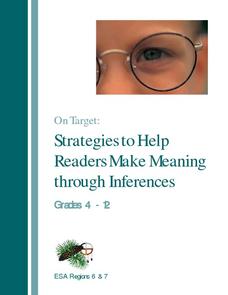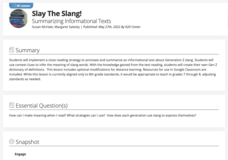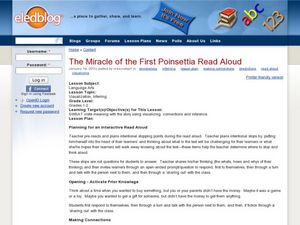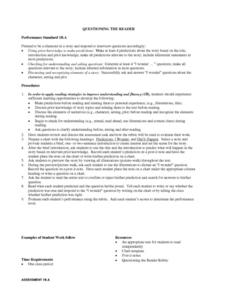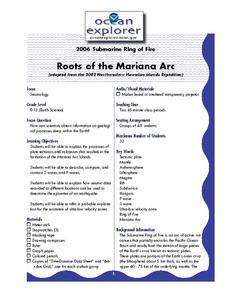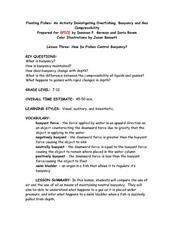Curated OER
On Target: Strategies to Help Readers Make Meaning through Inferences
Here's a resource that explicitly teaches, models, and provides readers with opportunities to practice the process of drawing inferences from text. Packed with strategies elementary, middle, and high school teachers can use, the resource...
Super Teacher Worksheets
Inferences
Inferring text can be tricky, but practice makes proficient! Provide your scholars with the practice they need with this inferences activity in which learners read mini paragraphs and choose the best inference from four multiple choice...
Prestwick House
Connotative vs. Denotative Meanings
Besides the dictionary definition, words also carry the added weight of meanings that are inferred or implied, meanings conferred on words, or connotations. To gain an understanding the importance of connotation, class members engage in...
It's About Time
Volcanic Landforms
Did you know the word volcano comes from the name of the Roman god of fire, Vulcan? During this activity, scholars make a topographic map, interpret topographic maps, and infer how lava will flow based on their analysis.
Prestwick House
Analyzing Multiple Interpretations of Literature
There is a reason why an Oscar is given each year for the Best Adaptation Screenplay. Adaptations are the focus of an exercise that asks class members to compare a work of literature with a least one adaptation of the work into a...
Curated OER
Foliage Tracker
Young scholars discuss the change of leaf colors and the role that climate and elevation play in those changes. They then track leaf changes, input data, and graph foliage changes with a free online tool.
University of Minnesota
Inquiry Cubes
How do you teach kids to "science" effectively? Inquiry cubes are a "sort of" puzzle with no answer—promoting even more questions! Group members work together to use the evidence on the visible sides of each cube to infer what lies on...
K20 LEARN
Slay the Slang! Summarizing Informational Texts
Middle schoolers get hip to the jive with a lesson about slang. They closely examine examples of slang and use context clues to infer the meaning of the terms. Groups read and summarize an article about a teacher who created a Gen Z...
Curated OER
The Miracle of the First Poinsettia
Connecting to literature and learning how to infer are two great reading strategies everyone needs to know. Here, the class will read along with the story The Miracle of the First Poinsettia, review folktales as a genre, and make...
Curated OER
Lesson Three: Strategies to Infer
Third graders make inferences with a text. In this inferring lesson plan, 3rd graders read Town Mouse Country Mouse by Jan Brett and they discuss the differences between city and country life. They make inferences as they read on the...
National Institute for Literacy
Making Sense of Decoding and Spelling
Go over digraphs, vowel sounds, and affixes with a series of decoding and spelling lessons. Each lesson guides learners through a different reading and phonics skill, building on the lesson before, and challenging them with each step.
Have Fun Teaching
When Am I? (16)
How can you tell when a story takes place? Use context clues to infer the time of day and seasons of five short reading passages. Kids then note each passage's time period as daytime or nighttime, as well as winter or summer.
Physics Classroom
Charge Interactions
Has your class been repelled by your previous magnetism lesson plan? Try a fun interactive instead! The activity, part of the Static Electricity series, challenges scholars to infer the charges of a group of magnets based upon their...
Curated OER
Abigail and John in Love
The second lesson in the series asks groups to analyze an exchange of love letters between Abigail and John Adams. Scholars identify the many allusions and references in the letters and consider what they can infer about the writers.
Curated OER
You Make the Call: Practicing Predictions
In this worksheet on making predictions, learners read 4 short scenarios that end with a question about what might happen next, then answer the question lines provided.
Curated OER
Questioning the Reader
Students consider various reading strategies to improve their understanding and fluency. They review their assessment task and rubric for how their work will be evaluated. They read a story and predict what will happen by recording...
Curated OER
Using Word Parts to Infer Meaning
Students examine the importance of physical activities and use word parts to infer meaning to a story. They discuss agility, baseball, and ballet dancing, read an article, and observe a demonstration on breaking down words and examining...
University of Minnesota
Sheep Brain Dissection
Bored with frog and earthworm dissections? Had your fill of fetal pigs? Anatomy students will be intrigued by the sheep's brain, and you will be prepared with guiding questions, extension activities, and pictures as they dissect one —...
Curated OER
Making Inferences: Scenario Worksheet
In this making inferences worksheet, learners read 5 statements and they write what they can infer about each statement. Students make their own inference scenario and identify what they can infer from their scenario.
Curated OER
Using Pre-reading Strategies: Infer
Use this resource to support your class practicing inference with poetry and visual art. The plan calls for an examination of "The Scream" by Edvard Munch and the "Mona Lisa" to promote speculation about artist's intent. From there, it...
Curated OER
Character Attributes in Writing
Third graders analyze the importance of characters in fiction writing and performances. In this theatre lesson, 3rd graders identify the important characteristics of a fictional character and how to portray a character through many...
Scholastic
Recovery From Drug Addiction
Are there factors that put some individuals at a higher risk for drug addiction than others? Learn more about the risk factors that may make some people more susceptible to addiction, as well as protective factors that help prevent...
Curated OER
Roots of the Mariana Arc
Plumb the depths of the Submarine Ring of Fire and explore seismic waves with this lesson. Junior geologists simulate s-waves and p-waves, calculate their speeds, and then apply the data to discover the material that makes up inner...
Curated OER
Floating Fishes: How do Fishes Control Buoyancy?
Playing with balloons, water, oil, and bottles help put this lesson over the top! Participants use air-filled balloons in water tanks to experience gas compression. They also use oil-filled bottles to experiment with buoyancy. Included...


